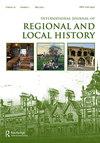《海上贝克希尔》,1917–1919:枫叶帝国?
Q2 Arts and Humanities
International Journal of Regional and Local History
Pub Date : 2019-01-02
DOI:10.1080/20514530.2019.1599793
引用次数: 1
摘要
摘要第一次世界大战一百周年使学术界对自治领及其对战争的贡献越来越感兴趣。现在是时候问问许多自治领士兵对他们驻扎的英国城镇产生了什么影响了。这篇文章将聚焦于驻扎在苏塞克斯海滨小镇贝克希尔的加拿大士兵。这篇文章借鉴了当地报纸,采用了Johnathan F Vance开发的枫叶帝国模式。它试图了解当地人对加拿大人的看法,以及用万斯的话来说,加拿大人是否“反向殖民”了这个小镇,使其看起来像是加拿大在英国的飞地。这篇文章表明,枫叶帝国的类型学是可信的,但如果说它以任何有意义的方式适用于贝克希尔,那就太夸张了。虽然加拿大人对该镇产生了影响,但其影响范围还不够广泛,不足以宣称反殖民。本文章由计算机程序翻译,如有差异,请以英文原文为准。
Bexhill-on-Sea, 1917–1919: A Maple Leaf Empire?
ABSTRACT The centenary of the First World War has brought about increased scholarly interest in the Dominions and their contribution to the war effort. It is now time to ask what impact the many Dominion soldiers had on the British towns where they were garrisoned. This article will focus on Canadian soldiers based in the Sussex town of Bexhill-on-Sea. Drawing on local newspapers, the article utilises the Maple Leaf Empire paradigm developed by Johnathan F Vance. It seeks to understand how the Canadians were perceived by the locals and whether the Canadians, in Vance’ words, “reverse-colonised” the town leading it to resemble a Canadian enclave in Britain. The article suggests that the Maple Leaf Empire typology has credence, but it is a stretch to say that it applies to Bexhill in any meaningful way. While the Canadians had an impact on the town, it was not wide-ranging enough to claim reverse-colonisation.
求助全文
通过发布文献求助,成功后即可免费获取论文全文。
去求助
来源期刊

International Journal of Regional and Local History
Arts and Humanities-History
CiteScore
0.30
自引率
0.00%
发文量
10
期刊介绍:
The International Journal of Regional and Local History aims to publish high-quality academic articles which address the history of regions and localities in the medieval, early-modern and modern eras. Regional and local are defined in broad terms, encouraging their examination in both urban and rural contexts, and as administrative, cultural and geographical entities. Regional histories may transcend both local and national boundaries, and offer a means of interrogating the temporality of such structures. Such histories might broaden understandings arrived at through a national focus or help develop agendas for future exploration. The subject matter of regional and local histories invites a number of methodological approaches including oral history, comparative history, cultural history and history from below. We welcome contributions situated in these methodological frameworks but are also keen to elicit inter-disciplinary work which seeks to understand the history of regions or localities through the methodologies of geography, sociology or cultural studies. The journal also publishes book reviews and review articles on themes relating to regional or local history.
 求助内容:
求助内容: 应助结果提醒方式:
应助结果提醒方式:


